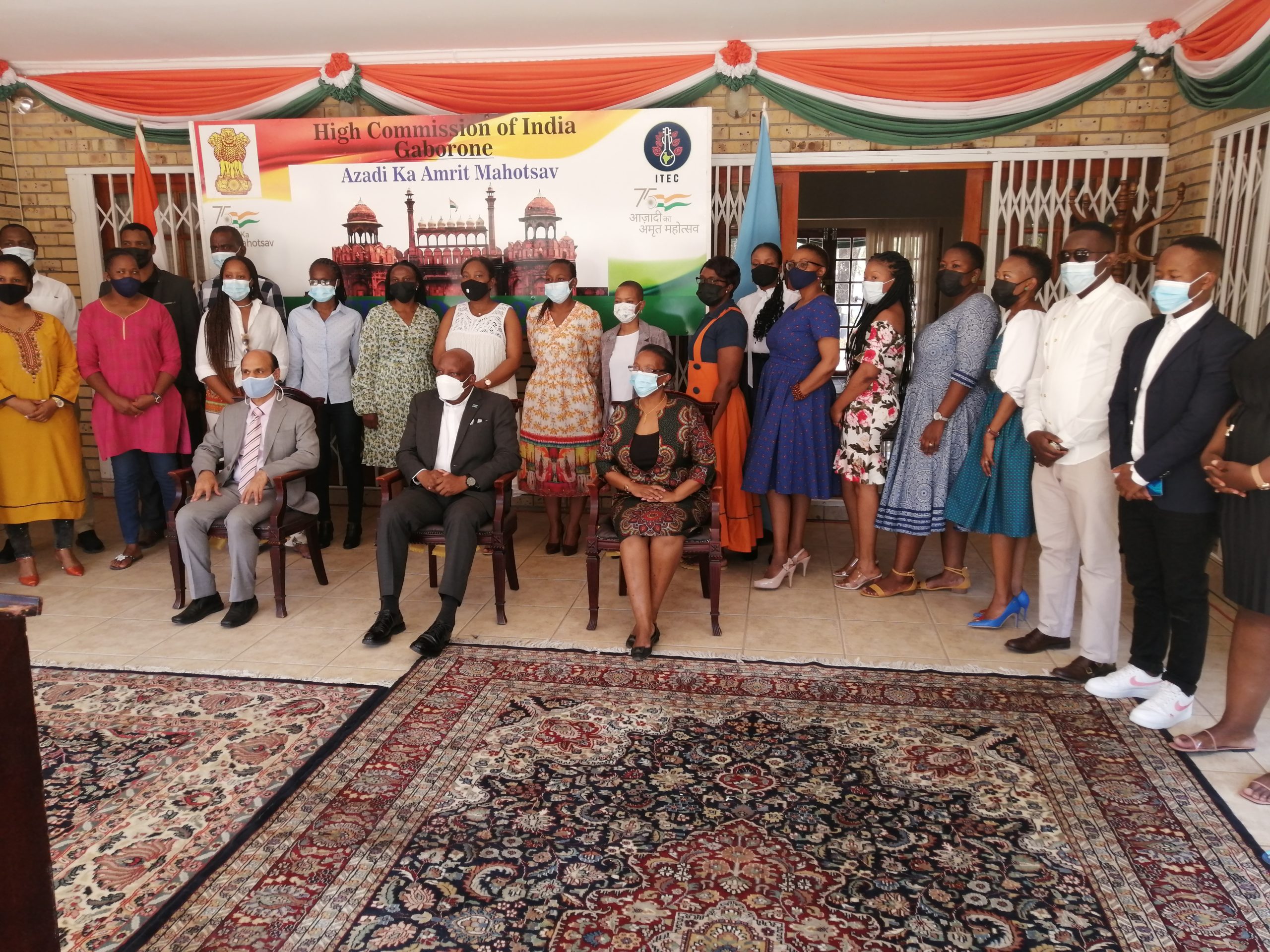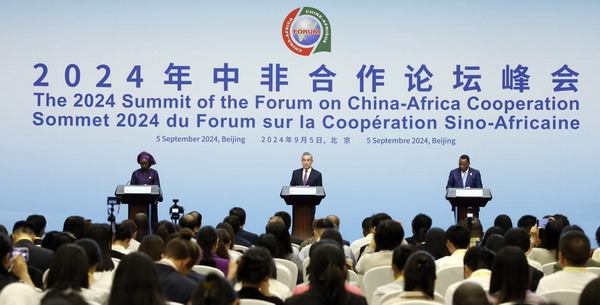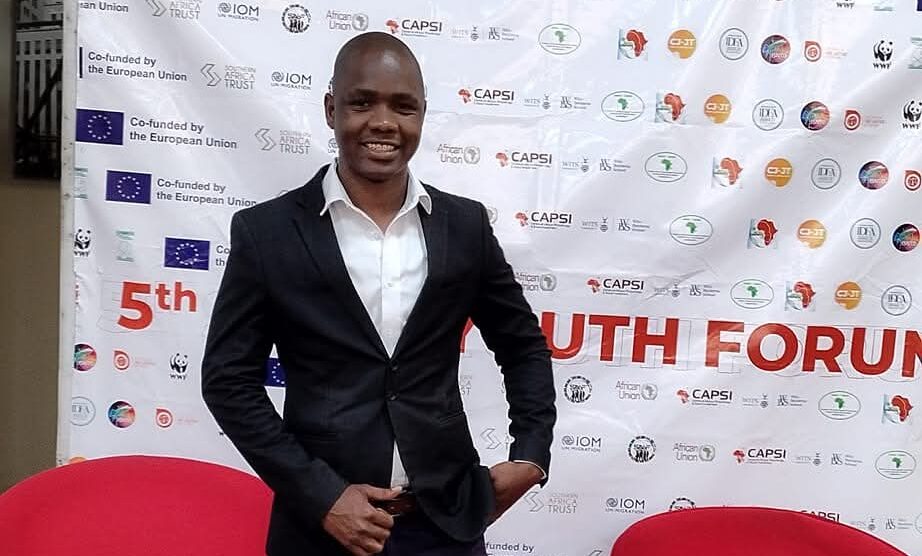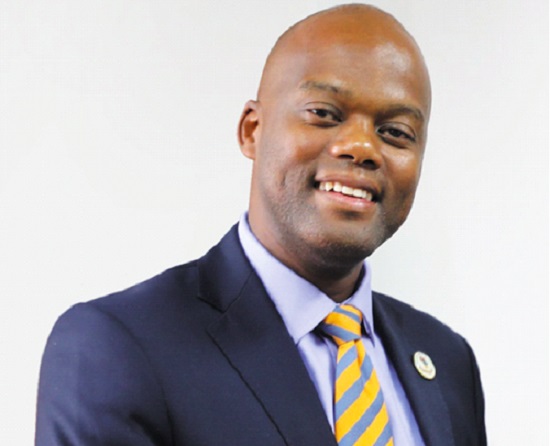
Dr. Ranjan and Minister Morwaeng flanked by some of the ITEC ALumni
The Pan Afrikanist Watchman
The Indian Technical and Economic Cooperation (ITEC) Day was celebrated at India House on the two consecutive days of September 25th and 26th 2021 in Gaborone.
Dr. Rajesjh Ranjan, the Indian High Commissioner to Botswana and SADC along with his wife had organized a get together for the ITEC Programme Alumni, whom he described as the “real ambassadors” of India and Botswana.

The event was graced by Minister of Public Administration, Governance and Presidential Affairs, Kabo Mprwaeng, who in his remarks hailed both the cordial relations that subsist between the two nations and described ITEC as a “flagship programme” through which India imparts knowledge, skills, experience, and technology to the Developing Countries.
Indeed Botswana has benefitted immensely, with a little over 1000 beneficiaries trained from various Indian institutions over the past five years under the ITEC programme.
Courses offered under ITEC include 1) Agriculture, Food And Fertilizer (2) Banking, Insurance, Finance, Accounts And Audit (3) Cyber Technologies, AI And Emergent Technologies (4) Education (5) Engineering And Technology (6) Environment And Climate Change (7) Government Function (8) Health And Yoga (9) Human Resource Development And Planning (10) IT And Telecommunication (11) Management And Leadership (12) Petroleum And Hydrocarbon (13) Power, Renewable & Alternate Energy (14) Project Management (15) Quality Management (16) Rural Development And Poverty Alleviation (17) SMEs And Entrepreneurship (18) Specialized Courses (19) Sustainable Development And South-South Cooperation (20) Trade And International Market (21) Urban Planning and (22) Women Empowerment
Giving a brief background, Ambassador Ranjan explained that the ITEC programme was instituted by a decision of the Indian Cabinet on 15 September 1964 as a bilateral programme of assistance of the Government of India.
The decision regarding setting up the ITEC programme was predicated on the underlying belief that “it was necessary to establish relations of mutual concern and inter-dependence based not only on commonly held ideals and aspirations but also on solid economic foundations. Technical and economic cooperation was considered to be one of the essential functions of an integrated and imaginative foreign policy.
The ITEC Programme is essentially bilateral in nature. However, in recent years, ITEC resources have also been used for cooperation programmes conceived in a regional and inter-regional context such as Economic Commission for Africa, Commonwealth Secretariat, UNIDO, Group of 77 and G-15.
In more recent years, its activities have also been associated with regional and multilateral organizations and cooperation groupings like Association of South-East Asian Nations (ASEAN), Bay of Bengal Initiative for Multi-Sectoral Technical and Economic Cooperation (BIMSTEC), Mekong-Ganga Cooperation (MGC), African Union (AU), Afro-Asian Rural Development Organization (AARDO), Pan African Parliament, Caribbean Community (CARICOM), World Trade Organization (WTO) and Indian Ocean Rim – Association for Regional Cooperation (IOR-ARC) and India-Africa Forum Summit.
The ITEC Programme, fully funded by the Government of India, has evolved and grown over the years. Under ITEC, 161 countries in Asia, Africa, East Europe, Latin America, the Caribbean as well as Pacific and Small Island countries are invited to share in the Indian developmental experience acquired over six decades of India’s existence as a free nation. As a result of different activities under this programme, there is now a visible and growing awareness among other countries about the competence of India as a provider of technical know-how and expertise as well as training opportunities, consultancy services and feasibility studies. These programmes have generated immense goodwill and substantive cooperation among the developing countries.
The ITEC Programme has the following components:
- Training (civilian and defence) in India of nominees from ITEC partner countries;
- Deputation of Indian experts abroad;
- Study Tours;
Training
· Training or capacity building is one of the major activities under ITEC. The professionals and people from developing countries are offered unique training courses, both civilian and defence, in different centres of excellence in India which empower them with not just professional skills, but prepare them for an increasingly globalized world.
- (a) Civilian Training Programme: For Civilian Training Programme, around 12000 scholarships are being offered to ITEC partner countries to attend the various training courses in India. The premiere institutions of India offers more than 300 short-term, medium-term and long-term courses during the year. The training programme is demand-driven and subjects selected are of interest to developing countries for their working professionals. The wide and diverse spectrum of skills and disciplines offered ranges from IT to rural development, parliamentary practices to entrepreneurship, marine to aeronautical engineering and so on. An encouraging trend of senior level participants from within and outside Government joining ITEC courses has been noticed which indicates the efficacy of the courses for capacity building, empowerment and upgrading of skills. At the specific request of partner countries, special courses on specific topics are also organized under the ITEC.
- (b) Defence Training: This covers training of personnel belonging to all the three wings of Defence Services, viz., Army, Air Force and Navy nominated by the ITEC partner countries in prestigious institutions like National Defence College, Defence Services Staff College, etc. The facility is also extended and availed of by some select developed countries on self financing basis. The training field covers Security and Strategic Studies, Defence Management, Marine and Aeronautical Engineering, Logistics and Management, etc.
Deputation of Indian Experts
- Indian experts are deputed to friendly countries on their request to assist in developmental activities. The experts study the problems and suggest solutions without disturbing the local socio-economic and cultural environment. Some of the fields covered in recent years have been creative arts, pest management, military training, IT, audit, medicine, English teaching, telecommunications, agricultural research, etc. Indian experiences and expertise in the fields of small and medium scale industries, agriculture and financial management have been found to be particularly relevant to the developing countries.
Study Tours
- Study tours in India are undertaken at the specific request of ITEC partner countries. Specific areas of interest are identified and two to three weeks programme is arranged during which the delegates are taken to important institutions, training centres, and places of interest in different parts of India.
Being a founder member of Colombo Plan, India is extending technical cooperation and assistance to Colombo Plan countries since 1950, under Technical Cooperation Scheme of Colombo Plan. Through this Scheme, India provides comprehensive and integrated training to participants from Asian member countries of Colombo Plan with the purpose of assisting them to enhance their administrative and technical capabilities through human resource development. The Ministry of External Affairs has been entrusted with the administration of the TCS of Colombo Plan since April 2010. Under this Scheme, India offers scholarships for training in India in premier centres of learning covering diverse disciplines keeping in mind the needs of our Colombo Plan countries.
ITEC is the flagship programme of the Indian Government’s capacity building effort, not only because of its magnitude and wide geographical coverage but also for innovative forms of technical cooperation. DPA-II Division of Development Partnership Administration (DPA) in the Ministry of External Affairs is the nodal division for handling all capacity building programmes. The ITEC Programme, along with the TCS of Colombo Plan, is a visible symbol of India’s role and contribution to South-South cooperation. South-South Cooperation is a partnership born out of a shared sense of solidarity and is entirely voluntary and free of conditionalities. It furthers the national development priorities of our partners and has national ownership at its centre. India remains a staunch proponent and practitioner of South-South Cooperation which constitutes a fundamental pillar of India’s foreign policy and diplomacy.
The ITEC SLOTS UTILIZED BY BOTSWANA
| YEAR | ITEC (CIVIL + DEFENCE) |
| 2011-2012 | 65 Civil |
| 2012-2013 | 57 Civil + 50 BDF |
| 2013-2014 | 27 Civil (Defence courses were not available) |
| 2014-2015 | 67 Civil + 30 Defence |
| 2015-2016 | 105 Civil + 53 Defence |
| 2016-2017 | 88 Civil (Defence Courses not available that year) |
| 2017-2018 | 111 Civil + 6 Defence |
| 2018-2019 | 177 Civil +16 Defence |
| 2019-2020 | 107 Civil + 03 Defence/Airforce |









